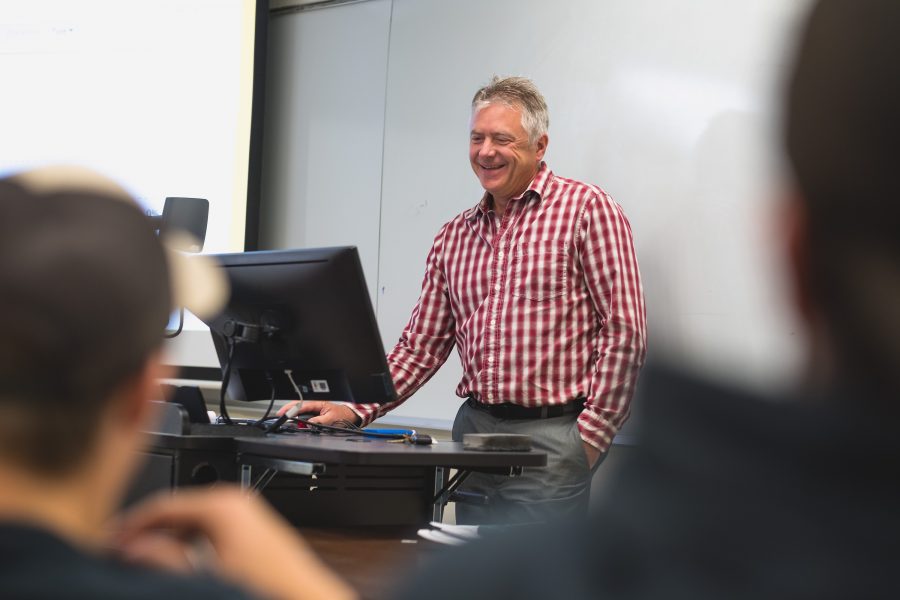
The College of Engineering at Michigan Technological University is pleased to announce that John Irwin has accepted the position of chair of the Department of Manufacturing and Mechanical Engineering Technology beginning July 1, 2020.
John Irwin is a professor and served as associate chair of the MMET department this past year with Materials Science and Engineering Professor Walt Milligan, who was interim chair during the department’s transition from the School of Technology to the College of Engineering.
“I am looking forward to Dr. Irwin’s leadership in the department of MMET. This is one of our strongest hands-on programs, graduating strongly qualified, highly sought graduates,” stated College of Engineering Dean Janet Callahan. “Dr. Irwin’s extensive experience with continuous improvement of academic programs through ABET is a strong asset he brings to the department.”
Irwin has taught many courses in the MET program. Most recently, courses in Parametric Modeling, Statics and Strength of Materials, Product Design and Development, CAE and FEA Methods, Computer-aided Manufacturing, and Senior Design.
His research interests include problem-based learning methods applied in the areas of CAD/CAM, static and dynamic model simulation, and product and manufacturing work cell verification. Dr. Irwin is also an affiliate professor with the Department of Cognitive Learning and Sciences, and Director of the Research and Innovation in STEAM Education (RISE) Institute at Michigan Tech.
Irwin earned an AAS Mechanical Design Engineering Technology from Michigan Tech in 1982, a BS in Technical Education at Ferris State University in 1984, an MS in Occupational Education at Ferris State University in 1992, and a EdD in Curriculum and Instruction at Wayne State University in 2005.
Irwin is a former collegiate cross country and track & field letter winner, and later competed as a company sponsored triathlete. Later he continued his athletic interests as a cross country coach for Mott Community College. John continues to run, swim and bike as an activity.
What first brought you to Michigan Tech?
I came to Michigan Tech from Mott Community College in Flint, Michigan, where I was a professor of design engineering technology. After earning a doctorate, I was interested in seeking a University position in engineering technology and/or STEM education. Fortunately, at that time there was a faculty opening in Michigan Tech’s School of Technology. As a graduate of Michigan Tech I had ties to the UP, and also family close to Houghton. Both things impacted my decision, but the high quality reputation of a Michigan Tech education is mainly what brought me here.
What are you hoping to accomplish as chair of the MMET department?
I’ve got an in-depth familiarity with the faculty and staff, having been an MET faculty member since 2006. We want to create a sustainable approach to funding capstone projects through industry relations, seek out advanced manufacturing research opportunities, facilitate the development of faculty-led multidisciplinary research projects, support continued program assessment accreditation procedures, and increase degree options for students. Maintaining the quality and services of the MMET Machine Shop is integral to reaching our goals.
What do you enjoy most about your research and teaching?
Working with students in their senior capstone design sequence courses provides me with an instant reward as a faculty member. I greatly enjoy advising and facilitating the engineering problem-solving process. For many students, the senior project is their first opportunity to manage a project budget, work in a team for more than just a few weeks, and attempt to provide the project deliverables. Most rewarding of all is to hear from students after they’ve graduated, and find they are well established in successful careers as engineers.
My research is very interconnected with my teaching. Specifically, I enjoy studying the use of simulations to better understand difficult-to-describe concepts, those that will benefit teaching and learning, and have a positive impact on industry in the long term. It is also especially wonderful to introduce many K-12 teachers to engineering concepts, and then see them apply those concepts in their classrooms.